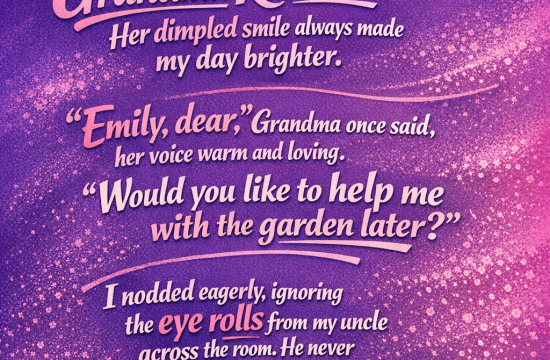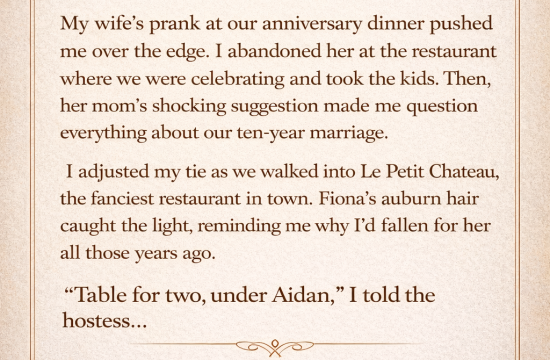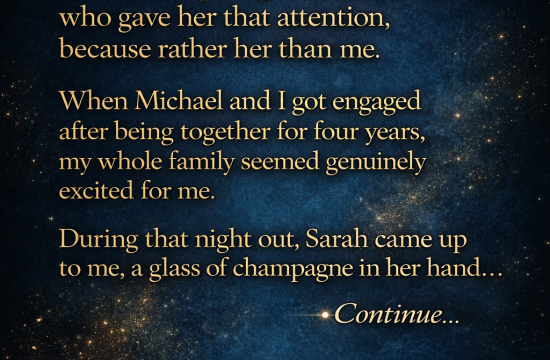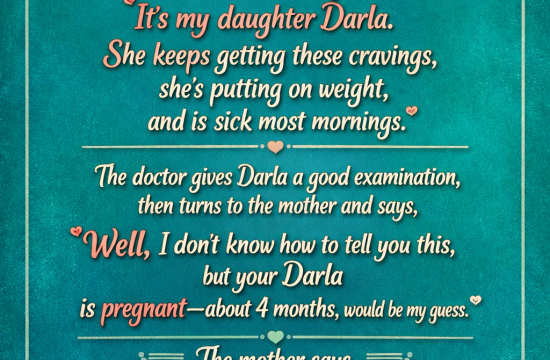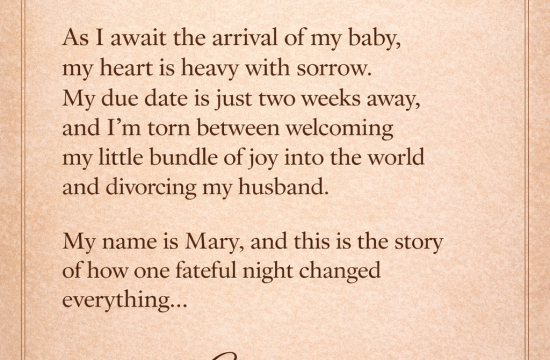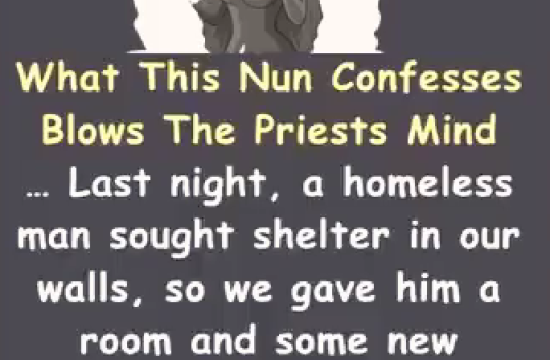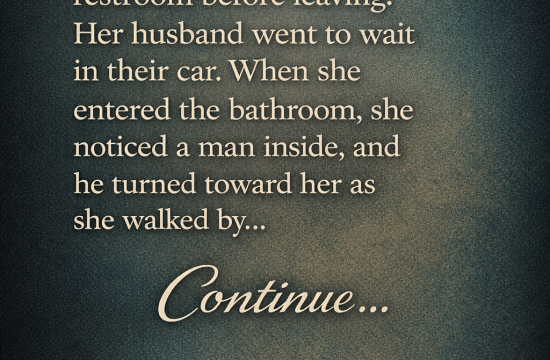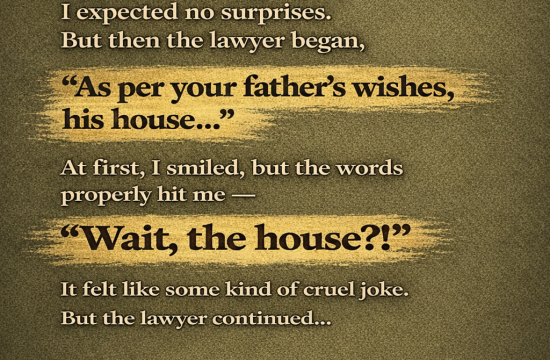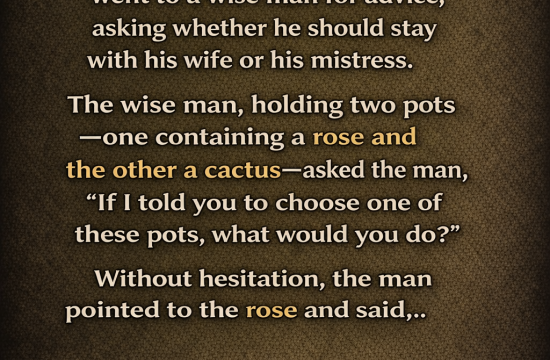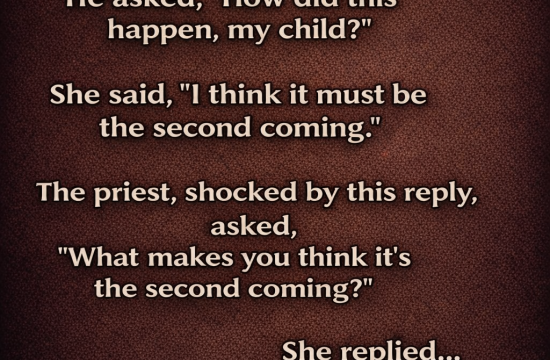Then Lucy came into the kitchen, bright-eyed and excited, asking if she could come too. Daniel didn’t even look up from tying the boys’ shoes.
He just said, flatly, “No. It’s family only.”
Lucy froze. The light drained from her face.
I stared at him. “What does that mean?”
He shrugged. “She’s not mine. I’m not spending a fortune dragging someone else’s kid around.”
Lucy quietly backed away, and I felt something inside me break open.
A little later, she came into my room and sat on the edge of the bed, legs dangling, voice trembling.
“Am I not part of this family?” she whispered.
She looked so small it nearly crushed me.
I didn’t want her to cry through the whole weekend—or carry that wound forever.
So I told her to grab her shoes.
We were going on our own adventure.
I had a couple hundred dollars saved from my dog-walking side job. I packed her into my beat-up Subaru, and we drove to the state fair three hours away.
At first, she didn’t smile. She stared out the window, hands folded neatly in her lap like she was trying not to take up space.
I kept cracking jokes, pointing at weird billboards, singing old songs off-key. Halfway there, when I butchered the lyrics to “Brown Eyed Girl,” she finally giggled. That sound felt like the sun coming up.
At the fair, she lit up—bright lights, funnel cakes, kids laughing, music everywhere. I bought her cotton candy bigger than her head. When she asked if we could ride the Ferris wheel, I said yes before she even finished.
At the top, with the whole world glowing beneath us, she leaned her head on my shoulder.
“I love you, Mom,” she whispered.
And right then, I knew: she was mine in every way that mattered. And I would fight for her with everything I had.
Back home, Daniel called, cheerful about how much fun he and the boys were having. When he asked where we were and I told him, his tone changed instantly.
“You’re being dramatic,” he snapped. “You’re teaching her to be entitled.”
I hung up mid-sentence.
The next day, Lucy and I went to a petting zoo. She laughed, playing with baby goats, chasing ducks, petting sleepy pigs. A woman complimented her dress and asked if she was my only child.
I found myself saying, “I have two boys too—but Lucy is my oldest.”
The woman nodded, and I could tell she saw a mother who chose her child, not one who was stuck with her.
When we got home Sunday night, Daniel was waiting. The boys were asleep, his mother gone. He didn’t even glance at Lucy.
“You can’t just take her and go,” he hissed. “You’re dividing this family.”
“No,” I said quietly. “You did that the moment you told my daughter she wasn’t part of it.”
He raised his voice. I calmly sent Lucy to her room. Then I said what I’d been avoiding:
“If you can’t accept Lucy, you can’t keep me.”
The next week was suffocating. He ignored me. Ate with the boys, left before Lucy and I entered.
The house felt poisoned—like something rotten lived in the walls.
One night, after Lucy went to bed, I found him staring at our wedding photo. His shoulders slumped, his face aged.
“I’m sorry if I hurt her,” he said quietly. “But I don’t feel connected to her. She’s… a stranger.”
“She’s a child,” I shot back. “You don’t get to choose whether she’s worth bonding with.”
He said he loved me and the boys and wanted to keep the family together.
I asked if he could truly love Lucy too—love her as his own.
He looked away.
That silence was my answer.
The next morning, I called a lawyer.
When I handed him the papers, he stared at them in disbelief.
“You’re throwing everything away,” he whispered.
“No,” I said. “You did that the day you told my daughter she didn’t belong.”
Moving out was chaos. I found a tiny apartment above a florist’s shop. It always smelled like roses.
Lucy said it felt like a fairy tale hideout.
Slowly, she bloomed.
No more flinching when voices rose.
No more shrinking into herself.
She laughed freely. Invited friends over. Made art everywhere.
Our apartment turned into a beautiful, joyful mess.
Daniel called often at first—angry, then guilty, then quiet.
But he never once asked to talk to Lucy.
Eventually, the calls faded.
Six months later, I met Corbin at the dog park. Gentle eyes, patient heart, a teenage daughter named Ivy.
The girls clicked immediately.
Corbin never rushed anything. Never overstepped.
One night, he made spaghetti with both girls helping. Watching them in the kitchen, laughing over dropped noodles, felt like seeing the life I’d always wanted but never had.
As I tucked Lucy in that night, she asked softly, “Will Corbin always be nice to me?”
“I can’t promise forever,” I told her. “But I know how to see who someone truly is—by how they treat the people I love.”
She nodded.
“I’m glad you chose me, Mom.”
That sentence sat in my heart like a glowing ember.
She saw everything—the hurt, the decisions, the escape.
And she understood.
A year later, we moved in with Corbin and Ivy.
The girls became sisters.
On weekends we camped in the backyard, roasting marshmallows under the stars.
It wasn’t fancy, but it was safe, and it was ours.
The boys visited too. They were cautious, but Corbin never pushed. Slowly, they warmed up.
By spring, they were inviting him to their school plays.
One quiet afternoon, I watched Lucy and the boys playing a board game.
I realized—this was my family now.
Not defined by blood, but by choice, effort, and love.
Almost two years after the divorce, Daniel called.
He said he’d been in therapy, realized how cruel he’d been to Lucy, and wanted to see her—if she was willing.
That night, I told her. She was silent for a long time.
Then she said, “I don’t need him to apologize. I just want him to be better for John and Mark.”
She was ten—yet wiser than most adults I knew.
A few months later, Daniel moved to another state.
He kept in touch with the boys, but never called for Lucy again.
And that was okay.
It was his loss—not hers.
Our blended family grew stronger.
Lucy and Ivy became inseparable.
Corbin and I would sit on the couch at night, wrapped in blankets, grateful for everything it took to get here.
I learned something profound:
Love is not always gentle. Sometimes it’s messy, painful, demanding.
But it is also a choice you make again and again.
I chose my daughter.
And in doing so, I finally chose myself.
Lucy knows now—without question—that she is loved, she belongs, and she will never again be treated like an afterthought.
Because real family isn’t who you’re born to.
It’s who shows up.
Who protects you.
Who stays.


